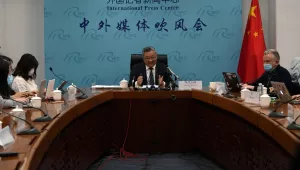Kim Jong Il's long vigil for signs of change in the U.S. hostile policy towards his regime has come to an end. Unlike previous tirades against the Bush administration, yesterday's North Korean foreign ministry statement was a clearly laid out collection of past North Korean complaints against U.S. policy. Despite the direct references to the United States, a close analysis of recent multilateral diplomatic efforts reveals that North Korea's statement is more likely intended for China. Based on recent research interviews with officials from the member states of the Six-Party Talks, Thursday's headlines raise the following important points.
First, North Korea has already stated that it possesses a nuclear arsenal. Indeed, at the trilateral meeting in Beijing in April 2003, Li Gun, North Korea's negotiator, made a direct reference to this point to Assistant Secretary of State James Kelly. In this respect, North Korea's statement about having "nukes" is not as dramatic as the headlines would imply.
Second, the primary target audience of North Korea's statement is not Washington, but Beijing. The real story that has been only receiving fragmented coverage and analysis is the deteriorating working relationship between Beijing and Pyongyang. Â Never one to be adept at long-term planning, North Korea has excelled at short-term stratagems. In the 1990s, Pyongyang benefited from a successfully concluded nuclear deal with Washington. Up until late 2002, North Korea received considerable monthly shipments of heavy fuel oil from the United States. With "juche" (self-reliance) now clearly a bankrupt policy, garnering substantial aid and assistance from key states and organizations has been the Kim Jong Il regime's major means for survival.
In the 2000s, Pyongyang has shifted its focus to China. Current estimates from intelligence agencies in Northeast Asia indicate that North Korea receives more than 70% of its fuel and over 40% of its food needs from China. With respect to the latter, such large-scale food aid is politically significant not only because of its size, but its destination. By directing the majority of China's food aid to the North Korean military, the Kim Jong Il leadership has also been able to receive steady shipments of rice and grain from South Korea and Japan. Having taken care of the military's food needs, the North Korean leadership has been effectively able to distribute South Korean and Japanese food assistance to its civilian population — all to the full satisfaction of both countries' food aid monitors. North Korean regime stability has thereby been ensured by Beijing.
Originally an effort to bring stability to the Korean peninsula in the wake of the uranium weapons program revelation, China is now being slowly dragged under a wave of its own creation. At present, China has staked its credibility on the Six-Party Talks process. For its efforts, Beijing has received the gratitude of Washington, Seoul, Tokyo and Moscow for stabilizing a dangerous situation. While China's prestige has grown, so has its exposure to North Korea's distinct negotiating style. As North Korea is the centerpiece of the Six-Party Talks — i.e., the main attraction that draws in the multilateral crowd — Pyongyang knows that its participation is an invaluable instrument with which it can extract further economic concessions from China.
Prior to previous rounds of talks, Beijing performed a now well-established routine of sending a high-level communist party official to Pyongyang cloaked as a senior Chinese parliamentarian. Each official's task has been to coax North Korea to attend the talks by offering to send more oil shipments or build a bottling factory.
While the Bush administration is likely to downplay North Korea's recent announcement, the Chinese leadership will be scrambling to find a way to bring North Korea back to the six-sided bargaining table in Beijing. The surprise is not necessarily that North Korea has formally declared that it possesses "nukes." Indeed, the Bush administration had already been working under the premise that North Korea had nuclear weapons. The shock is that North Korea has firmly stated that it will suspend participation in the Six-Party Talks indefinitely. That shock resonates loudest in Beijing.
Now, with North Korea's focus on sustainable economic development rather than direct aid, the terms of its continued participation in the Six-Party Talks may have become more expensive. Cognizant that it will be treated as an outpost by Washington for the next four years, North Korea appears to be seeking internal economic development as a way to weather the neocon storm. The Chinese are certain to find out what's on North Korea's shopping list when a senior Chinese Communist Party official travels to Pyongyang later this month. His Herculean task: to bring the main attraction to Beijing for the fourth round of Six-Party Talks.
Dr. John Park is a Fellow at the Belfer Center for Science and International Affairs at Harvard University's John F. Kennedy School of Government. His research focuses on China's efforts to resolve the North Korean nuclear crisis.
Park, John. “China's Herculean N. Korea Task.” The Korea Herald, February 12, 2005



